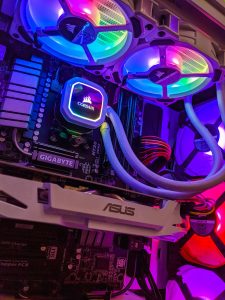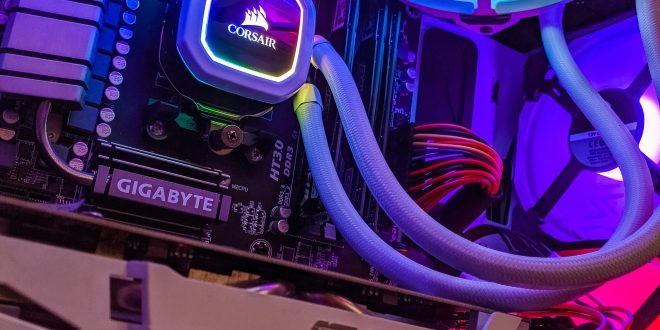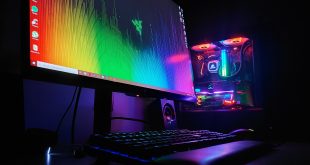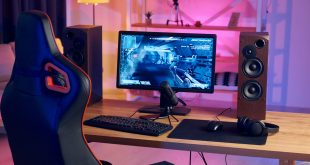Are you ready to take your gaming experience to the next level? If so, then you’ve come to the right place! In this guide, I’m going to show you step by step how to choose the best buy desktop for gaming. Whether you’re a casual gamer or a hardcore enthusiast, finding the perfect gaming desktop can be a daunting task. With so many options and specifications to consider, it’s easy to feel overwhelmed. But fear not, because by the end of this guide, you’ll have all the knowledge and confidence you need to make an informed decision. So, let’s dive in and find the gaming desktop of your dreams!

Table of Contents
Quick Tips
Tip 1: Consider your budget carefully. Look for desktop computers within your price range that offer the necessary specifications for smooth gaming performance.
Tip 2: Pay attention to the processor and graphics card. Look for a desktop with a powerful processor (like an Intel Core i5 or i7) and a dedicated graphics card (like an NVIDIA GeForce or AMD Radeon) to ensure optimal gaming capabilities.
Tip 3: Check the RAM and storage options. Aim for a desktop with at least 8GB of RAM for smooth multitasking while gaming. Additionally, consider the storage options such as SSD (Solid State Drive) for faster loading times.
Tip 4: Read reviews and compare specifications. Take the time to research different models, read customer reviews, and compare the specifications to make an informed decision. This will help you find the best buy desktop that meets your gaming needs.
Assess the processor speed and opt for a powerful one for smooth gaming experiences
If you want to enhance your gaming experiences and enjoy smooth gameplay, one crucial aspect to consider is the processor speed of your device. To ensure optimal performance, here’s a step-by-step guide to assessing processor speed and choosing a powerful one. First, determine the minimum requirements for the games you plan to play. Read the system requirements on the game’s website or packaging to find the recommended processor speed. This will give you a baseline for the kind of processor speed you should aim for.
Next, research the processors available in the market. Look for processors that meet or surpass the recommended speed for your games. Pay attention to the number of cores a processor has, as this can impact its performance. More cores allow the processor to handle multiple tasks simultaneously, resulting in smoother gameplay. Additionally, consider the processor’s cache size, as a larger cache can help improve processing speed.
Finally, compare prices and select a processor that fits your budget while still meeting the necessary requirements. Keep in mind that investing in a more powerful processor now can save you from having to upgrade sooner in the future. By following these steps and selecting a high-performance processor, you can ensure that your gaming experiences are smooth, lag-free, and incredibly enjoyable.
When to Just Buy a Gaming PC Prebuilt…
Research the RAM capacity and select a desktop with sufficient memory for optimal gaming performance
A desktop computer’s RAM capacity is important in determining whether it will meet your gaming needs. When researching different desktop models for your gaming needs, first find out how much RAM each has. You want to make sure that the desktop you choose has sufficient memory to handle the demands of your favorite games. By doing your research, you can find a desktop that will provide a smooth and enjoyable gaming experience.
Once you have a good understanding of the RAM capacity you need, the next step is to select a desktop that meets those requirements. Look for models that have the specific amount of RAM you are looking for, whether it’s 8GB, 16GB, or more. Pay attention to the type and speed of RAM as well, as these can also impact gaming performance. By carefully selecting a desktop with sufficient memory, you can ensure that you have the necessary resources to run your games smoothly.
After you have found a desktop with sufficient RAM capacity, it’s time to consider other factors that can enhance your gaming experience. Look for features such as a powerful graphics card, a fast processor, and ample storage space. These components work together to provide you with the best gaming performance possible. Additionally, consider the cooling system of the desktop, as gaming can generate a lot of heat. A desktop with efficient cooling will help prevent overheating and keep your system running smoothly even during intense gaming sessions.
Evaluate the storage options, including SSDs or HDDs, based on your budget and gaming needs
Are you a gaming enthusiast looking to upgrade your storage options for a smoother gaming experience? Evaluating the storage options, such as Solid State Drives (SSDs) or Hard Disk Drives (HDDs), based on your budget and gaming needs is essential. Let me guide you through this how-to style outline for choosing the right storage option.
Firstly, assessing your budget is crucial. SSDs are known for their superior speed and performance, but they can be more expensive compared to HDDs. If you have a larger budget, investing in an SSD is the way to go. On the other hand, if you’re on a tighter budget, HDDs provide a more affordable option with larger storage capacities. Consider your gaming needs and determine the amount of storage required for your games, as this will also impact your budgetary considerations.
Next, it’s important to evaluate your gaming needs. If you’re an avid gamer who plays graphics-intensive games or works with large files, an SSD is the ideal choice. The faster loading times and improved performance will greatly enhance your gaming experience. However, if you’re a casual gamer or primarily use your computer for lighter tasks, an HDD can still provide ample storage for your gaming needs. Assess the types of games you play, the size of game files, and your overall usage patterns to make an informed decision.
By evaluating the storage options, considering your budget and gaming needs, you’ll be able to choose the most suitable option for your gaming setup. Remember to weigh your budget constraints against the performance benefits offered by SSDs, and consider the types of games you play to determine the necessary storage capacity. With the right storage option in place, you’ll be well on your way to an enhanced gaming experience.
Look for desktops with advanced cooling systems to prevent overheating during long gaming sessions
During long gaming sessions, it is crucial to have a desktop computer with advanced cooling systems to prevent overheating. When you are engrossed in a game, your computer’s components work overtime, generating a significant amount of heat. Without proper cooling, this heat can lead to performance issues and even cause damage to your system. To ensure an enjoyable and uninterrupted gaming experience, prioritize desktops with advanced cooling systems.
Look for desktops with robust cooling fans that are designed to efficiently dissipate heat from your computer’s internal components. These fans are typically larger and faster than regular ones and can effectively cool down your system even during intense gaming sessions. Additionally, some desktops come equipped with liquid cooling solutions, which are even more effective at keeping temperatures low. Liquid cooling systems use a radiator and coolant to effectively absorb and transfer heat away from vital computer components.
Another important factor to consider is the placement of vents and air intakes in the desktop’s design. Opt for desktops that have well-ventilated cases with strategically placed openings to facilitate proper airflow. This allows fresh, cool air to circulate through the system while pushing warm air out. Adequate ventilation helps prevent heat buildup and ensures that your computer operates at optimal temperatures, allowing you to fully immerse yourself in your gaming adventures without worrying about overheating issues.
It is essential to invest in a desktop computer that has advanced cooling systems if you wish to enjoy long gaming sessions. Look for desktops with robust cooling fans or liquid cooling solutions to efficiently dissipate heat. Additionally, prioritize desktops with well-ventilated cases and strategically placed openings to promote proper airflow. By selecting a desktop with advanced cooling mechanisms, you can ensure that your gaming experience remains smooth and enjoyable without any interruptions due to overheating.
Conclusion
Choosing the best buy desktop for gaming can greatly improve your gaming experience, so choosing the right one is crucial. When it comes to gaming, you can ensure that your desktop has the necessary capabilities by carefully considering the graphics card specifications, processor speed, and RAM capacity. Investing in a desktop with high-performance graphics, a powerful processor, and sufficient memory will not only improve your gaming experience but also provide a smoother and more enjoyable gaming experience overall. So, take the time to research and choose wisely, as it can truly make a difference in your life as a gamer.
FAQ
FAQ: How to Choose the Best Buy Desktop for Gaming
1. How do I determine which desktop is suitable for gaming?
To choose the best desktop for gaming, consider factors like the processor (CPU), graphics card (GPU), RAM, storage space, and connectivity options. Look for higher-end components, such as the latest Intel or AMD processors, dedicated graphics cards like NVIDIA GeForce or AMD Radeon, at least 8GB of RAM, SSD storage, and multiple USB ports for connecting peripherals.
2. Should I go for a pre-built gaming desktop or build one myself?
Both options have their advantages. Pre-built gaming desktops save you time and effort as they come ready-to-use, often with warranties and customer support. On the other hand, building your own desktop allows for customization and potentially more cost-effective solutions. Evaluate your technical expertise, time availability, and budget to make the best decision.
3. Are gaming laptops comparable to gaming desktops?
Gaming laptops offer portability, but they may not match the performance and upgradability of gaming desktops. Laptops are limited by their size, cooling abilities, and power consumption. Desktops, with their larger form factor, can accommodate high-performance components and are easier to upgrade.
4. What role does the CPU play in gaming desktops?
The CPU handles the majority of processing tasks in gaming and affects overall performance. Look for CPUs with higher clock speeds and multiple cores. Popular choices for gaming CPUs are Intel Core i5 or i7, or AMD Ryzen 5 or 7 processors.
5. How important is the GPU for gaming desktops?
The GPU is crucial for gaming as it handles the rendering of graphics. Opt for dedicated graphics cards from well-known manufacturers, with higher VRAM and processing power. Some popular options include NVIDIA GeForce GTX or RTX series and AMD Radeon RX series.
6. Should I prioritize RAM capacity or speed?
Both are important, but having a balance is ideal. Aim for at least 8GB of RAM, preferably with a speed of 3200MHz or higher, as modern games and applications require sufficient memory capacity and faster speeds for smoother performance.
7. What storage options should I consider for a gaming desktop?
A combination of solid-state drive (SSD) and hard disk drive (HDD) is recommended. SSDs offer faster boot times and reduced loading screens, making them excellent for storing the operating system and frequently played games. HDDs are cost-effective for larger storage needs, like holding game libraries.
8. Should I consider the power supply when purchasing a gaming desktop?
Absolutely! It’s vital to have a power supply unit (PSU) that can handle the demands of high-performance components, as well as leave room for upgrades. Ensure the PSU has enough wattage and is from a reputable brand to prevent issues and ensure stable power delivery.
9. How does the display affect gaming on a desktop?
While displays are not part of the desktop itself, they impact the overall gaming experience. Look for monitors with a high refresh rate (144Hz or higher) and low response time (1ms) to eliminate motion blur and input lag. Additionally, consider resolution preferences and panel types (e.g., TN, IPS, or VA) based on your gaming needs and budget.
10. Is the price the only factor to consider when choosing a gaming desktop?
Price is an important consideration, but it shouldn’t be the sole deciding factor. Balancing your budget with performance requirements and long-term upgradability is key. Investing a bit more in higher-end components can ensure your desktop remains relevant for gaming and other demanding tasks for a longer time.
Remember, researching and reading reviews before making a purchase is extremely beneficial.
 convert-midi Latest Updated Live News From convert-midi
convert-midi Latest Updated Live News From convert-midi



